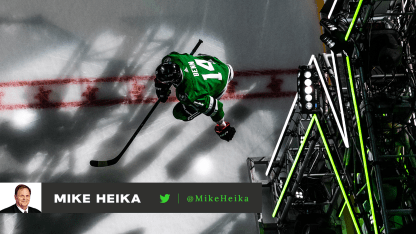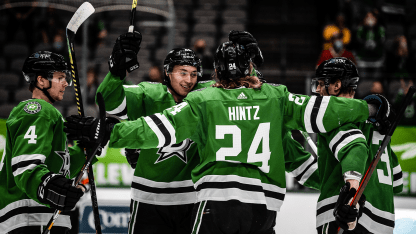Like a Beat poet or a latter-day James Joyce, my playoff hockey thoughts often turn to a stream of consciousness.
That's pretty much how the brain works anyway, but when it comes to putting those thoughts on paper (or the computer screen), I often lapse into an inner monologue of Dylan's "Subterranean Homesick Blues" or The Love Song of J. Alfred Prufrock.
'My inner monologue is writing': How far can the Stars go next year?
Fully healthy, the Stars should have a group that can make a run for the Stanley Cup next season

By
Mike Heika
Senior Staff Writer
"Do I dare to eat a peach?"
It can be distracting.
And yet, that's both the complexity and the beauty of this sport. There's a different brand of hockey that's played during the regular season and the playoffs. You can view it on your Vizio every night. The decisions that are made by coaches and players and officials clearly dictate the outcome, and yet so does luck and fate and inches here and there. It's a fascinating world when you're trying to discern what the Stars need to do going forward, so coming to conclusions on all of that can be just a little bit confusing.
Mix in the many voices of "experts" and fans and friends that swirl through the oxygen and land in your ears, and that's a lot to digest.
For example, the biggest question fans are asking themselves about the Stars this offseason is how do they create more offense? For some, it's paramount in structuring the lineup to allow not only more scoring in all 12 forward spots, but also to trend toward younger, faster players. And while that seems like a really good idea, you watch the playoffs and see that maybe the team's that think defense first really do fare better.
Of the top 13 teams in goals-against average during the regular season, only Dallas (eighth at 2.64) didn't make the playoffs. The Golden Knights, Avalanche and Islanders were top three. Now, you can say that both Vegas and Colorado are great offensive teams, but the Islanders finished 21st in scoring at 2.71 goals per game, which was worse than Dallas (18th at 2.79).
To be fair, the top 14 scoring teams made the playoffs. However, eight of those teams were eliminated in the first round, and much was made of their inability to score goals in the postseason. So, is there a different kind of hockey played in the playoffs, and do teams that lean toward too much offense get shut down too easily?
It's worth discussing.

Of course, the teams that beat them came up with the big goals, so that speaks to the fact that being able to do both is really what you want.
That's where stream of consciousness leads you sometimes.
Obviously, a lot of the goals for and against are determined by goaltending. The Islanders and Golden Knights had the highest save percentages during the regular season. Tampa Bay was seventh, but the Lightning have probably the greatest goalie in the world with Andrei Vasilevskiy. Montreal is interesting. The Canadiens went from almost missing the playoffs because of a .901 save percentage to winning the North with a playoff-best .935 mark.
This year's playoffs seem to underscore the fact goaltending is the most important position in sports.
That also leads the brain to look back at last year's playoffs. When you see Colorado and Vegas battling like they are, it's easy to say the Stars beat both in the bubble and that should mean something. But the Avalanche had to use their third goalie, and the Golden Knights, in retrospect, made the wrong choice in net.
That shouldn't be held against the Stars. They did what they had to do against the players who were out there, and I truly believe you can't take that away. Should it be considered in your decision-making going forward? Sure. But it also speaks to the need to be deep and good in net. The Islanders are using both of their goalies, so there are all sorts of ways to get things done.
Bottom line, the Stars with a similar core have gone seven games with the Blues in 2019 and took down Calgary, Colorado and Vegas in 2020, and you have to think as you watch these games that they could do similar things against the best in the league if they're healthy and in the playoffs.
They just have to get there.
One of the reasons all of that has been bouncing around my brain is because so many people like to look at former Stars players excelling in the playoffs and then ponder if they should've kept them or if they should've developed them better. You can make arguments for each player. Valeri Nichushkin is a regular in a great Colorado lineup, and many believe the Stars dropped the ball on the former first-round pick. But Nichushkin has three points in 10 playoff games this year, and I'm not sure he was ever going to be good in Dallas. I think the best argument is the Stars should've realized that earlier and traded him when he had value.
Fans also are bemoaning the fact the Stars let both Mattias Janmark and Corey Perry get away in the offseason. While it's true both are having solid playoff years (Janmark with seven points in nine games for Vegas and Perry with six points in 11 games for Montreal), keeping both around would've likely meant that Jason Robertson didn't get the chance he did this season.
It's all speculation, but so is dreaming that Janmark, Nichushkin and Perry would be doing the same thing for Dallas that they are for other teams. But that's how our minds work at this time of the year.
Now, if you want to argue that had the Stars kept Perry and Janmark and iced a more offensively aggressive lineup, that would be something to talk about. There's a chance the team loses Andrew Cogliano and Blake Comeau this summer as both can become unrestricted free agents. Should the front office be asking if the Stars would be better with nine forwards who could produce points and be pretty good defensively? Should they risk some defense for more offense?
That's something you can imagine. How would this team have looked with Perry and Janmark in place of Comeau and Cogliano? That's a philosophical debate that could be fun.
The one concrete statement I can make is that playoff hockey is indeed different, and you have to be prepared to compete in a different way. You watch Mark Stone and you see that good defense really can lead to good offense. You watch the Islanders or Canadiens and ponder that maybe low-event hockey can succeed.
You look at how the Stars have played in previous postseasons and can imagine they do have a pretty good game plan.
Stars GM Jim Nill has said many times that you really do need to build a team that can compete in the regular season and the playoffs, and that those can be two very different teams and the same team all at the same time. That's what the Stars are seeking, and I really think the past 12 months have proven they can do both when they're healthy.
See, sometimes you can pull a fish from this rollicking stream.
Victory Club memberships are available now for 2021-22! Beyond season tickets, don't miss your chance to secure the best seats for Stars home games, plus exclusive benefits, members-only experiences and much more. Click here to learn more!
This story was not subject to the approval of the National Hockey League or Dallas Stars Hockey Club.
Mike Heikais a Senior Staff Writer for DallasStars.com and has covered the Stars since 1994. Follow him on Twitter @MikeHeika, and listen to his podcast.


















